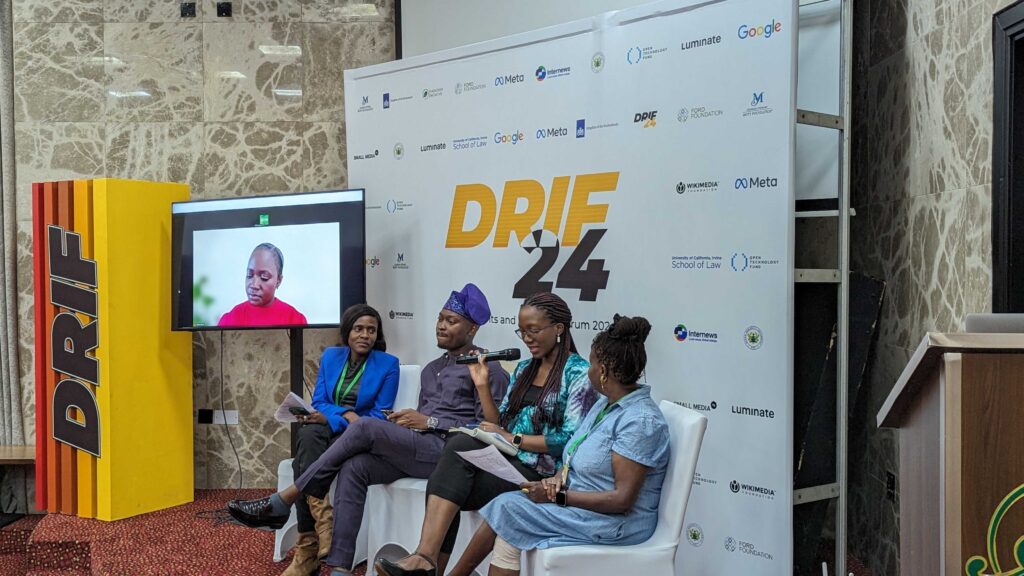On Wednesday, 24 April during the Digital Rights and Inclusion Forum in Accra, Ghana, the Freedom Online Coalition (FOC) hosted a panel session featuring speakers from government, civil society, and the private sector titled “Advancing a Human Rights-Based and Multistakeholder Approach to Internet and Digital Technology Governance”.
The session commenced with opening remarks from Mr. Luca Kuiper, Policy Officer at the Ministry of Foreign Affairs of the Kingdom of the Netherlands, 2024 Chair of the FOC. Mr. Kuiper noted the importance of the topics discussed at the Digital Rights and Inclusion Forum in light of the ongoing processes at the United Nations, including the Global Digital Compact (GDC) process. Mr. Kuiper emphasised the goal of ensuring these processes are grounded in human rights and the multistakeholder approach. Mr. Kuiper highlighted the FOC’s outreach to African partners through activities such as the FOC Regional Dialogue held at DRIF, focused on engaging stakeholders from governments, civil society, and academia, in the region, and noted the FOC’s most recent member from the region to join the Coalition, Cabo Verde. In addition, Mr. Kuiper noted the increasing pressure on human rights in the digital age, emphasising the continuing decline of Internet freedom, on top of new developments around emerging technologies, allowing governments tools for surveillance, censorship, and spreading disinformation.
Following the opening remarks, session moderator Dr. Grace Githaiga, co-Convenor of the Kenya ICT Action Network, introduced the panellists which included Elizabeth Orembo, Research Fellow, Research ICT Africa; Emmanuella Darkwah, Senior Manager, International Cooperation, Cyber Security Authority, Ghana; Adeboye Adegoke, Senior Manager, Paradigm Initiative; and Emilar Gandhi, Head of Stakeholder Engagement and Policy Development, Meta.

With the increased adoption of digital technologies across the continent, panellists noted the desire to raise awareness of access to these technologies as being not only a luxury, but a right and socioeconomic necessity. The speakers discussed the opportunities of integrating digital tools into everyday life in a deliberate and strategic manner, which can lead to more meaningful inclusion and access, increased efficiency in public services and education, and heightened transparency and integrity in democratic electoral processes.
However, the need to be cognisant of the digital divide and lack of meaningful connectivity and digital literacy in the African context was highlighted, as well as the possible negative impacts on human rights that new and emerging technologies could have without policies and legislation that aim to address, minimise and remedy these risks, including those related to data governance and protection, privacy, cybersecurity, hate speech and online harassment, disinformation, and access to information. Panellists also flagged the lack of harmonisation among these policies across the continent, noting efforts from the African Union on this matter, and emphasised unequal access to the Internet creating additional digital divide. Additionally, panellists noted much of the technologies that are used on the continent are foreign, raising the issue of a lack of appropriate data and research for the African context. This increases the difficulty of using these technologies for the benefit of a society that has different economic, social and cultural needs and norms.
In light of the raised opportunities and challenges for the region, participants continued to highlight the importance of local stakeholders engaging in global processes and conversations related to the governance of digital technologies to ensure a strong case is made for the interests of the continent, emphasising it as essential to harness digital technologies for upholding human rights, advancing development, and contributing to the social, economic, and cultural benefit for the region. Creating opportunities to foster dialogue and connect the various stakeholders, including governments, civil society organisations, the technical community, and the private sector (such as telecom companies, social media companies, and other companies offering digital services), is critical to ensure a rights-respecting digital future. In this sense, raising the capacity of local stakeholders and ensuring an accessible channel to regional state delegations is essential for engagement in processes such as the Global Digital Compact. However, panellists noted the logistical difficulties of participating in governance processes such as those in the United Nations, highlighting the unfavourable power dynamics and limited accessibility, where international cooperation through coalitions such as the FOC, and multistakeholder initiatives, is key to enable this access.
The session highlighted concrete recommendations for the FOC to help address the opportunities and challenges related to digital technologies and human rights in the region, including: continuing to create opportunities for multistakeholder and international dialogues on these issues; empowering local civil society actors in engaging with their governments, and in both national and global governance processes; exemplifying the benefit and value of multistakeholder engagement on a local and international level to regional governments; and encouraging capacity building of local actors.
